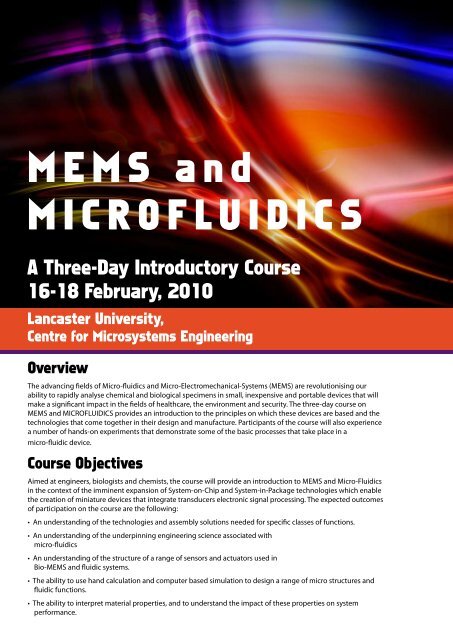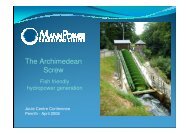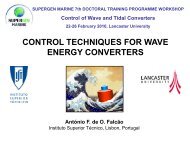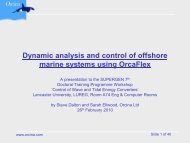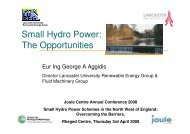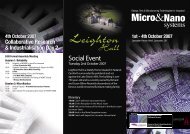MEMS and MICROFLUIDICS - Lancaster University
MEMS and MICROFLUIDICS - Lancaster University
MEMS and MICROFLUIDICS - Lancaster University
You also want an ePaper? Increase the reach of your titles
YUMPU automatically turns print PDFs into web optimized ePapers that Google loves.
<strong>MEMS</strong> <strong>and</strong><br />
<strong>MICROFLUIDICS</strong><br />
A Three-Day Introductory Course<br />
16-18 February, 2010<br />
<strong>Lancaster</strong> <strong>University</strong>,<br />
Centre for Microsystems Engineering<br />
Overview<br />
The advancing fields of Micro-fluidics <strong>and</strong> Micro-Electromechanical-Systems (<strong>MEMS</strong>) are revolutionising our<br />
ability to rapidly analyse chemical <strong>and</strong> biological specimens in small, inexpensive <strong>and</strong> portable devices that will<br />
make a significant impact in the fields of healthcare, the environment <strong>and</strong> security. The three-day course on<br />
<strong>MEMS</strong> <strong>and</strong> <strong>MICROFLUIDICS</strong> provides an introduction to the principles on which these devices are based <strong>and</strong> the<br />
technologies that come together in their design <strong>and</strong> manufacture. Participants of the course will also experience<br />
a number of h<strong>and</strong>s-on experiments that demonstrate some of the basic processes that take place in a<br />
micro-fluidic device.<br />
Course Objectives<br />
Aimed at engineers, biologists <strong>and</strong> chemists, the course will provide an introduction to <strong>MEMS</strong> <strong>and</strong> Micro-Fluidics<br />
in the context of the imminent expansion of System-on-Chip <strong>and</strong> System-in-Package technologies which enable<br />
the creation of miniature devices that integrate transducers electronic signal processing. The expected outcomes<br />
of participation on the course are the following:<br />
• An underst<strong>and</strong>ing of the technologies <strong>and</strong> assembly solutions needed for specific classes of functions.<br />
• An underst<strong>and</strong>ing of the underpinning engineering science associated with<br />
micro-fluidics<br />
• An underst<strong>and</strong>ing of the structure of a range of sensors <strong>and</strong> actuators used in<br />
Bio-<strong>MEMS</strong> <strong>and</strong> fluidic systems.<br />
• The ability to use h<strong>and</strong> calculation <strong>and</strong> computer based simulation to design a range of micro structures <strong>and</strong><br />
fluidic functions.<br />
• The ability to interpret material properties, <strong>and</strong> to underst<strong>and</strong> the impact of these properties on system<br />
performance.
Course Plan<br />
Each day has a theme <strong>and</strong> consists of a number of lectures together with a lab session as shown below. The lectures cover a<br />
wide range of topics from basic micro-fluidic processes to design <strong>and</strong> integration, through to the application of devices to<br />
solve real-world problems.<br />
Day 1:<br />
Micro-fluidic<br />
Processes<br />
Day 2:<br />
Integration<br />
Technologies<br />
Day 3:<br />
Design <strong>and</strong><br />
Application<br />
Introduction <strong>and</strong><br />
course outline<br />
Sensors <strong>and</strong><br />
Actuators<br />
Intro to MEMES<br />
<strong>and</strong> Micro-fluidics<br />
Manufacturing<br />
Processes<br />
Basic Micro-fluidic<br />
Processes <strong>and</strong><br />
Theory<br />
Packaging <strong>and</strong><br />
Integration<br />
Modelling <strong>and</strong> Design Applications<br />
for <strong>MEMS</strong>/<br />
microfluidics<br />
Lab Introduction Lab: Micro-fluidic Mixing<br />
LabView based<br />
systems<br />
Applications<br />
for <strong>MEMS</strong>/<br />
microfluidics<br />
Lab Sessions<br />
The lab sessions provide a h<strong>and</strong>s-on demonstration of three basic micro-fluidic processes;<br />
mixing, separation <strong>and</strong> droplet generation. The micro-fluidic devices used for these experiments<br />
are produced by Epigem, a leader in polymer based micro-engineering, <strong>and</strong> allow participants<br />
to observe the processes <strong>and</strong> interactions as they take place using a Labview based PC control<br />
system. An example of a ‘mixing’ device is shown in the picture below.<br />
Location<br />
The campus of <strong>Lancaster</strong> <strong>University</strong> is located<br />
three miles south of the city of <strong>Lancaster</strong>, with<br />
easy access by road (M6 junction 33) <strong>and</strong> main<br />
line rail. It’s proximity to the Lake District <strong>and</strong><br />
Yorkshire Dales makes <strong>Lancaster</strong> an ideal place<br />
to visit. The city has a rich cultural heritage <strong>and</strong><br />
has much to offer from castles <strong>and</strong> museums, to<br />
theatres, pubs <strong>and</strong> fine eateries.<br />
Lab: Micro-fluidic Separation<br />
Lab: Droplet<br />
generation<br />
Who should attend this course?<br />
This course is ideal for post-graduate students who are starting research work in the Micro-fluidic area, as well as engineers,<br />
biologists <strong>and</strong> chemists who have a need for a practical introduction to the topic. Attendees on the course should hold a<br />
university degree or equivalent in a biology, chemistry, bio-chemistry or electronics related degree, <strong>and</strong> an underst<strong>and</strong>ing of<br />
basic physics <strong>and</strong> electronics at a high school level. No background underst<strong>and</strong>ing of <strong>MEMS</strong> or Micro-fluidics is necessary, nor<br />
are attendees expected to be accomplished engineers or bio-chemists.<br />
Fees<br />
A small fee of £50 is required to confirm a place on the course <strong>and</strong> to cover administrative costs. Places are limited to a<br />
maximum of twenty participants.<br />
Contact details<br />
For further information on course details <strong>and</strong> content, please contact Dr. Nick Burd on 01524 593014<br />
or email: n.burd@lancaster.ac.uk.<br />
To reserve a place on the course <strong>and</strong> to receive information on accommodation options, please contac<br />
Claire Duff on 01524 593053 or email c.duff@lancaster.ac.uk.<br />
An Epigem mixing chip


